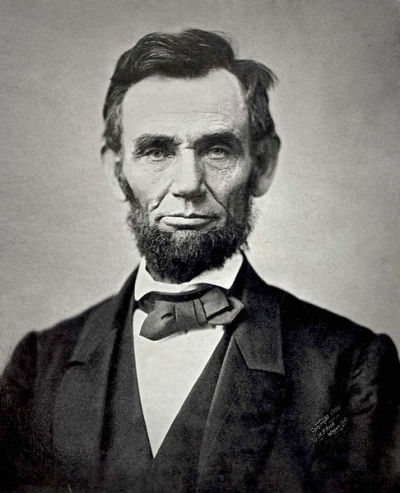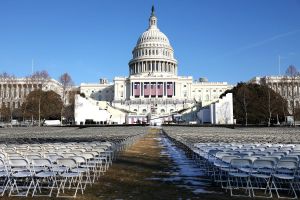Our atheist presidents?

Some in Congress recently attempted to remove “so help you God” from witness testimony. This is just the latest skirmish in the effort to erase God from the public square and especially the halls of government.
Atheists are doing their best to remove God from our nation’s future, and have even rewritten history to try to erase Him from our past. They maintain that to date the United States has actually had four presidents who were atheists. They cite Thomas Jefferson, Abraham Lincoln, George Washington, and James Madison.
All four are listed on websites such as Positive Atheism and Celebrity Atheist with a collection of quotations designed to make them appear atheistic. However, both of these atheist sites are having trouble with the truth. Since this is the month we observe the birthdays of Lincoln and Washington and the catch-all Presidents Day, let’s look at each of these men and consider their own words about God.
Thomas Jefferson
In an article exploring whether an atheist could ever be president, The Washington Post gets to the truth of the matter about Jefferson, “the only candidate in American history charged with being an atheist”:
Federalists repeatedly attacked him as an infidel who would destroy the nation’s Christian foundations and staunchly promote secularism. Several factors kept Jefferson from being defeated. Most important, the accusations were false—he believed in God, repeatedly affirmed God’s providence, and frequently worshiped in Episcopal churches, so many discounted these attacks as mere political partisanship.1
Jefferson, selected to write the original draft of the Declaration of Independence, is credited with being its author. In it, he cites four references to God. After acknowledging God as the Lawgiver (“the Laws of Nature and of Nature’s God”), Jefferson then identifies Him as our Creator, Judge, and Protector:
We hold these truths to be self-evident, that all men are created equal, that they are endowed by their Creator with certain unalienable Rights, that among these are Life, Liberty and the pursuit of Happiness...
We, therefore..., appealing to the Supreme Judge of the world for the rectitude of our intentions,...declare, that these United Colonies are, and of Right ought to be Free and Independent States...
And for the support of this Declaration, with a firm reliance on the protection of divine Providence, we mutually pledge to each other our Lives, our Fortunes and our sacred Honor.2
Jefferson later reiterated similar ideas, that God gave us life and will one day be our Judge:
God who gave us life gave us liberty. And can the liberties of a nation be thought secure when we have removed their only firm basis, a conviction in the minds of the people that these liberties are of the gift of God? That they are not to be violated but with his wrath? Indeed I tremble for my country when I reflect that God is just: that his justice cannot sleep forever.3
In a letter to Benjamin Rush, Jefferson clearly stated that he was no atheist:
To the corruptions of Christianity I am indeed, opposed; but not to the genuine precepts of Jesus himself. I am a Christian, in the only sense in which he wished any one to be; sincerely attached to his doctrines, in preference to all others.4
Abraham Lincoln
Not only was Lincoln not an atheist, but he wouldn’t vote for one, either. After his political opponent spread rumors that Lincoln was a religious scoffer, Lincoln wrote in a public statement refuting the charges: “I do not think I could myself, be brought to support a man for office, whom I knew to be an open enemy of, and scoffer at, religion.”5
As for his beliefs, Honest Abe was honest only because he feared God. He believed that he was ultimately responsible to his Creator. He told Congress that each of us will be held accountable in eternity:
In times like the present, men should utter nothing for which they would not willingly be responsible through time and eternity. 6
Abraham Lincoln also directed his thanks to God for his personal political victories:
I am thankful to God for this approval of the people...I give thanks to the Almighty for this evidence of the people’s resolution to stand by free government and the rights of humanity. 7
Here Lincoln speaks of his love of the Bible and his thankfulness to God for giving it to humanity:
In regard to this Great Book, I have but to say, it is the best gift God has given to man. All the good the Savior gave to the world was communicated through this book. But for it we could not know right from wrong. All things most desirable for man’s welfare, here and hereafter, are to be found portrayed in it. 8
One who recognizes the Bible as a gift from God and the source of morality, believes in eternal life, and acknowledges the Savior—as Lincoln does here—is not an atheist. Following are Lincoln’s thoughts about his prayer-life and his dependence on God:
I have been driven many times upon my knees by the overwhelming conviction that I had nowhere else to go. My own wisdom, and that of all about me, seemed insufficient for the day. 9
President Barack Obama quoted these words of Lincoln before inviting the American people to likewise call out to God:
NOW, THEREFORE, I, BARACK OBAMA, President of the United States of America, do hereby proclaim May 5, 2011, as a National Day of Prayer. I invite all citizens of our Nation, as their own faith or conscience directs them, to join me in giving thanks for the many blessings we enjoy, and I ask all people of faith to join me in asking God for guidance, mercy, and protection for our Nation. 10
George Washington
Here are just a few of the many thoughts of our first president, “the father of his country,” in reference to God and prayer:
I now make it my earnest prayer that God would...most graciously be pleased to dispose us all to do justice, to love mercy, and to demean ourselves with that charity, humility, and pacific temper of the mind which were the characteristics of the Divine Author of our blessed religion.11
You do well to wish to learn our arts and ways of life, and above all, the religion of Jesus Christ. These will make you a greater and happier people than you are. 12
While we are zealously performing the duties of good citizens and soldiers, we certainly ought not to be inattentive to the higher duties of religion. To the distinguished character of Patriot, it should be our highest glory to add the more distinguished character of Christian. 13
In his memorable Farewell Address, our beloved first president reiterated the importance of religion in the life of our nation—not only in the citizens but in all who take the oaths of office:
Of all the dispositions and habits which lead to political prosperity, Religion and Morality are indispensable supports. In vain would that man claim the tribute of Patriotism, who should labor to subvert these great pillars of human happiness, these firmest props of the duties of Men and Citizens...Let it simply be asked where is the security for property, for reputation, for life, if the sense of religious obligation desert the oaths, which are the instruments of investigation in Courts of Justice? And let us with caution indulge the supposition, that morality can be maintained without religion. Whatever may be conceded to the influence of refined education on minds of peculiar structure; reason and experience both forbid us to expect that national morality can prevail in exclusion of religious principle. 14
James Madison
James Madison, the Chief Architect of the Constitution, was, like the others we’ve looked at, a believer in God and not an atheist. He said,
A watchful eye must be kept on ourselves lest, while we are building ideal monuments of renown and bliss here, we neglect to have our names enrolled in the Annals of Heaven. 15
The belief in a God All Powerful wise and good, is so essential to the moral order of the World and to the happiness of man, that arguments which enforce it cannot be drawn from too many sources. 16
I have sometimes thought there could not be a stronger testimony in favor of religion or against temporal enjoyments, even the most rational and manly, than for men who occupy the most honorable and gainful departments and are rising in reputation and wealth, publicly to declare their unsatisfactoriness by becoming fervent advocates in the cause of Christ; and I wish you may give in your evidence in this way. 17
Benjamin Franklin
Though he was never president, Benjamin Franklin served our country in many other roles, and is another Founding Father who is said to be an atheist. Steven Shaw, who compiled a list of “clearly confirmed atheists” for AskMen.com, said, “One of the most famous men in American history, and regarded as the most intelligent of those who signed the Declaration of Independence, Franklin is a surprise addition to this list.” 18 Let’s see if he belongs on their list:
Forasmuch as ingratitude is one of the most odious of vices, let me not be unmindful gratefully to acknowledge the favors I receive from Heaven...For all Thy innumerable benefits; for life, and reason, and the use of speech; for health; and joy; and every pleasant hour—my Good God, I thank Thee. 19
I have lived, Sir, a long time, and the longer I live, the more convincing proofs I see of this truth—that God governs in the affairs of men. And if a sparrow cannot fall to the ground without his notice, is it probable that an empire can rise without his aid? We have been assured, Sir, in the Sacred Writings, that “except the Lord build the House, they labour in vain that build it.” I firmly believe this; and I also believe that without his concurring aid, we shall succeed in this political building no better than the builders of Babel. 20
In a letter to Ezra Stiles (president of Yale College), written just a month before he died, Franklin cited his beliefs in great detail:
Here is my Creed: I believe in one God, Creator of the Universe. That he governs it by his Providence. That he ought to be worshipped. That the most acceptable Service we can render to him, is doing Good to his other Children. That the Soul of Man is immortal, and will be treated with Justice in another Life respecting its Conduct in this...As to Jesus of Nazareth, my opinion of whom you particularly desire, I think the system of morals and his religion as he left them to us, the best the world ever saw, or is likely to see. 21
As the atheist website Free Thought rightfully conceded, “None of the Founding Fathers were atheists.”22 Still, these four “atheist” presidents are firmly carved in stone on skeptic’s websites as firmly as the four who are on Mount Rushmore, apparently in an effort to bolster the faith of the faithless.
Notes:
1. Gary Scott Smith, “Americans are deeply religious, so will we ever see an atheist president?” The Washington Post, March 23, 2015 .
2. Declaration of Independence .
3. Thomas Jefferson, Notes on the State of Virginia (Trenton: Wilson & Blackwell, 1803), Query XVIII, p. 272. .
4. Thomas Jefferson, Letter to Benjamin Rush, April 21, 1803.
5. Abraham Lincoln, Letter published in the Illinois Gazette, August 15, 1846.
6. Abraham Lincoln, Message to Congress, December 1, 1862.
7. Abraham Lincoln, Response to a Serenade, November 8, 1864.
8. Abraham Lincoln, Reply to Loyal Colored People of Baltimore upon Presentation of a Bible on September 7, 1864.
9. Abraham Lincoln, Lincoln Observed: Civil War Dispatches of Noah Brooks, Michael Burlingame, ed. (Baltimore: The Johns Hopkins University Press, 1998), p. 210.
10. “Presidential Proclamation—National Day of Prayer,” April 29, 2011 .
11. George Washington, The Last Official Address of His Excellency George Washington to the Legislature of the United States (Hartford: Hudson and Goodwin, 1783), p. 12.
12. George Washington, The Writings of Washington, John C. Fitzpatrick, ed. (Washington: Government Printing Office, 1932), Vol. XV, p. 55, from his speech to the Delaware Indian Chiefs on May 12, 1779.
13. George Washington, General Orders, May 2, 1778 .
14. George Washington, Farewell Address, September 19, 1796 .
15. James Madison, Letter to William Bradford, November 9, 1772. The Letters and Other Writings of James Madison (New York: R. Worthington, 1884).
16. James Madison, Letter to Frederick Beasley, November 20, 1825.
17. James Madison, Letter to William Bradford, September 25, 1773. The Papers of James Madison, William T. Hutchinson, ed. (Illinois: University of Chicago Press, 1962), Vol. I, p. 96.
18. Steven Shaw, “Top 10: Unknown Atheists,” AskMen.com .
19. Benjamin Franklin, The Writings of Benjamin Franklin, Vol. 2, Albert Henry Smyth, ed. (New York: The MacMillan Company, 1905), pp. 99–100.
20. Benjamin Franklin, Speech to the Constitutional Convention, June 28, 1787, Library of Congress .
21. Benjamin Franklin, Works of Benjamin Franklin, John Bigelow, ed. (New York: G. P. Putnam’s Sons, 1904), p. 185, to Ezra Stiles, March 9, 1790.
22. “Our founding fathers were not Christians,” July 5, 2011 .
Adapted from Fat Chance: Why Pigs Will Fly Before America Has an Atheist President.
Ray Comfort is the Founder and CEO of Living Waters and the bestselling author of more than 80 books, including God Has a Wonderful Plan for Your Life, How to Know God Exists, and The Evidence Bible. He cohosts the award-winning television program “Way of the Master,” seen in almost 200 countries, and is the Executive Producer of “180,” “Evolution vs. God,” “Audacity,” and other films. He is married to Sue and has three grown children, and hasn’t left the house without gospel tracts for decades. You can learn more about his ministry at LivingWaters.com.




























